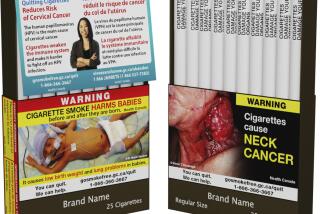Ad Drive on Aspirin, Disease Will Begin
- Share via
WASHINGTON — Product labels warning against the use of aspirin for children suffering from chicken pox and flu will begin appearing in stores this summer but an advertising campaign will start next week to alert the public to the link between the drug and the often-fatal Reye’s syndrome, the government announced Wednesday.
Health and Human Services Secretary Margaret M. Heckler, who called for such voluntary action Jan. 9, praised the industry for what she called “its prompt and responsible action, which will be getting the message to Americans within a week.”
But Dr. Sidney Wolfe, director of the public-interest Health Research Group, which wanted immediate warning labels placed on bottles, criticized the action as insufficient because it will not occur until after the end of this year’s flu season.
“People may see a poster in a store when they buy the aspirin, but a few weeks after they’ve brought the bottle home, they could forget they ever saw a warning,” Wolfe said. “There has to be a warning label on the bottle itself, right now, before any more children die.”
Dr. Joseph White, president of the Aspirin Foundation of America, said it would be less expensive and more efficient to produce labels for new products than to label existing products. The advertising campaign--which will include posters and warning stickers on store shelves, as well as radio and television announcements--is “a practical way of covering products existing in the pipeline,” he said.
White added: “Our surveys show that the present awareness is so great that we’re already pushing to the upper limits.”
But one manufacturer, Plough Inc., of Memphis, Tenn., which makes St. Joseph Aspirin for Children, announced that it will put warning stickers on its products immediately, put package inserts in aspirin products and begin producing new labeling next week with stronger language than that agreed upon by members of the Aspirin Foundation. Plough is not a member of the foundation, which represents most major aspirin producers.
Disease Can Be Fatal
Reye’s syndrome is characterized by the sudden onset of vomiting, often with fever and sometimes accompanied by lethargy, severe headaches and changes in behavior. It can progress quickly to convulsions, delirium and coma and is fatal 20% to 30% of the time.
A recent government-conducted pilot study indicated that children and teen-agers suffering from flu or chicken pox are 12 to 25 times more likely to develop Reye’s syndrome when given aspirin than sick children who do not take the drug.
Plough’s new labels will read in part: “WARNING: Reye syndrome is a rare but serious disease which can follow flu or chicken pox in children and teen-agers. While the cause of Reye syndrome is unknown, some reports claim aspirin may increase the risk of developing this disease.”
Although the standard reference to the disease is Reye’s syndrome, the government and Plough referred to it as Reye syndrome.
Members of the Aspirin Foundation will not mention Reye’s syndrome in their labels. They have agreed to delete recommendations for use in flu from labels of children’s aspirin and to add the following warning to labels of all aspirin products: “Consult a physician before giving this medicine to children, including teen-agers, with chicken pox or flu.”
White said his industry is not convinced of the causal relationship between aspirin and Reye’s syndrome. “If it isn’t true, we’re not going to put it on our label,” he said.
But the posters and public service announcements will say in part: “A rare but serious childhood disease called Reye syndrome may develop in children who have chicken pox or flu. Although the cause of Reye syndrome is not known, some studies suggest a possible association with medicines containing salicylate or aspirin.”
More to Read
Inside the business of entertainment
The Wide Shot brings you news, analysis and insights on everything from streaming wars to production — and what it all means for the future.
You may occasionally receive promotional content from the Los Angeles Times.








